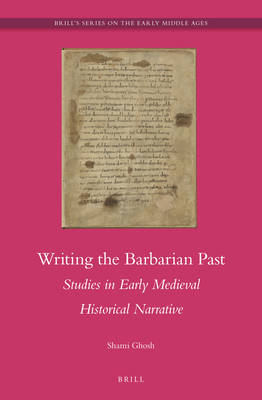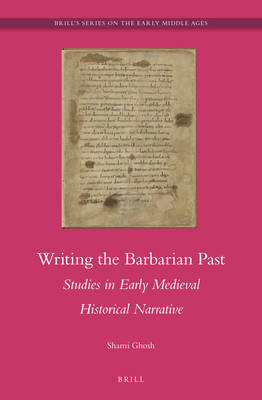
- Afhalen na 1 uur in een winkel met voorraad
- Gratis thuislevering in België vanaf € 30
- Ruim aanbod met 7 miljoen producten
- Afhalen na 1 uur in een winkel met voorraad
- Gratis thuislevering in België vanaf € 30
- Ruim aanbod met 7 miljoen producten
Zoeken
Writing the Barbarian Past: Studies in Early Medieval Historical Narrative
Shami Ghosh
€ 280,95
+ 561 punten
Omschrijving
Writing the Barbarian Past examines the presentation of the non-Roman, pre-Christian past in Latin and vernacular historical narratives composed between c.550 and c.1000: the Gothic histories of Jordanes and Isidore of Seville, the Fredegar chronicle, the Liber Historiae Francorum, Paul the Deacon's Historia Langobardorum, Waltharius, and Beowulf; it also examines the evidence for an oral vernacular tradition of historical narrative in this period.
In this book, Shami Ghosh analyses the relative significance granted to the Roman and non-Roman inheritances in narratives of the distant past, and what the use of this past reveals about the historical consciousness of early medieval elites, and demonstrates that for them, cultural identity was conceived of in less binary terms than in most modern scholarship.
In this book, Shami Ghosh analyses the relative significance granted to the Roman and non-Roman inheritances in narratives of the distant past, and what the use of this past reveals about the historical consciousness of early medieval elites, and demonstrates that for them, cultural identity was conceived of in less binary terms than in most modern scholarship.
Specificaties
Betrokkenen
- Auteur(s):
- Uitgeverij:
Inhoud
- Aantal bladzijden:
- 332
- Taal:
- Engels
- Reeks:
- Reeksnummer:
- nr. 24
Eigenschappen
- Productcode (EAN):
- 9789004305229
- Verschijningsdatum:
- 6/11/2015
- Uitvoering:
- Hardcover
- Formaat:
- Genaaid
- Afmetingen:
- 155 mm x 236 mm
- Gewicht:
- 589 g

Alleen bij Standaard Boekhandel
+ 561 punten op je klantenkaart van Standaard Boekhandel
Beoordelingen
We publiceren alleen reviews die voldoen aan de voorwaarden voor reviews. Bekijk onze voorwaarden voor reviews.








